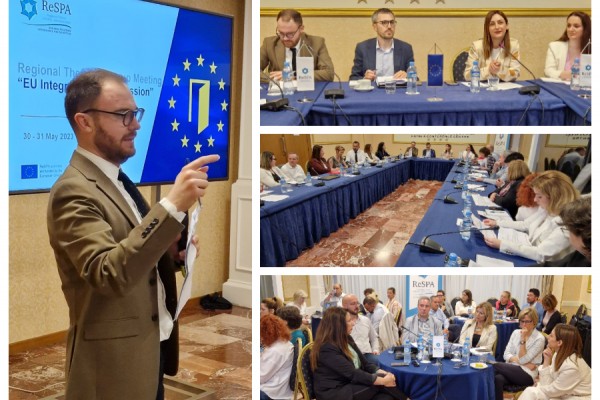
Regional Thematic Group Meeting on “European Integration and Accession” Joined Forces of the Western Balkans Actors for More Accelerated EU Accession
30-31 May 2023, Tirana, Albania
Designed as a regional platform to enhance regional cooperation, knowledge exchange, and learning in the domain of EU accession, the Meeting aimed to contribute to a more efficient implementation of the EU accession agenda by bringing together key officials dealing with European integration and accession negotiations processes. Focusing on capacity-building needs, further advancement of the gradual integration between EU and Western Balkans, the accelerated integration, and the phasing-in to EU Policies, programs, and frameworks, participants explored scenarios for speeding up the journey towards the Union. They followed live and reflected on the keynote speech of the President of EC, Ursula von der Leyen, delivered during the GLOBSEC2023 Forum, where the new “Growth Plan” initiative for the Western Balkans was introduced, leading to deepened regional economic integration and increase of pre-accession funds
For two intensive days, conceptualized as a networking and learning forum, public servants discussed the EU accession momentum in each administration, progress in IPA III planning and implementation, readiness for Chapter 22 and implementation of cohesion policy, the interlinks among the new EU Enlargement Methodology and Green Agenda, the accelerated political and policy engagement, etc. Specific focus was paid to the EU Decision making scheme, interpreting the relation between EU policy and EU law, while participants jointly identified prospective needs and initiatives for capacity building and peer exchange to be addressed in a regional approach.
“Placing Public Administration Reform under Cluster “Fundamentals” for the accession talks with the EU is a clear message on the crucial role that a reformed and resilient public sector shall play in accelerating the EU accession process.. The crucial links between the policies and their proper implementation and credible track records are the institutional and administrative capacities. This Meeting is an important step in consolidating bridges of cooperation, sharing experiences, learning together, and developing new skills among peers and practitioners coordinating the accession process. ReSPA is committed to supporting its members in strengthening their institutional and human capacities for achieving tangible results in this complex process,” said ReSPA Director Maja Handjiska-Trendafilova opening the Meeting.
Gentian Xhaxhiu, ReSPA Programme Coordinator, presented ReSPA’s activities and direct support instruments for the Members in the domain of EUI for the upcoming period: “These two days we witnessed the importance of regional sharing and brainstorming on numerous critical topics in this positive momentum for the accession process. Although ReSPA Members are at different stages of EU integration, we find a way to deliver meaningful capacity-building actions and utilize ReSPA direct support instruments to fit their needs best. That is why I see this Meeting as a priceless learning and exchanging platform not only for our attendees but also for us at ReSPA and the experts. If we want to make considerable steps in progressing with the EU accession process and benefit from the current momentum, we need to join forces, explore scenarios, work together and find the best solutions; that’s what we exactly did during the last two days”.
Reforming public administration and building strong institutions is now at the heart of the accession process: the re-organization of the negotiating chapters into clusters sees Public Administration reform under the fundamental cluster, meaning that the region must deliver more credibly on the commitment to implement reforms that lead to strong and resilient institutions, good governance, etc. The current principles of Public Administration clearly refer to strengthening the capacities and mandate of the structures that coordinate the European Integration process, harmonizing policy planning with the accession priorities, transposing EU acquis, etc.



